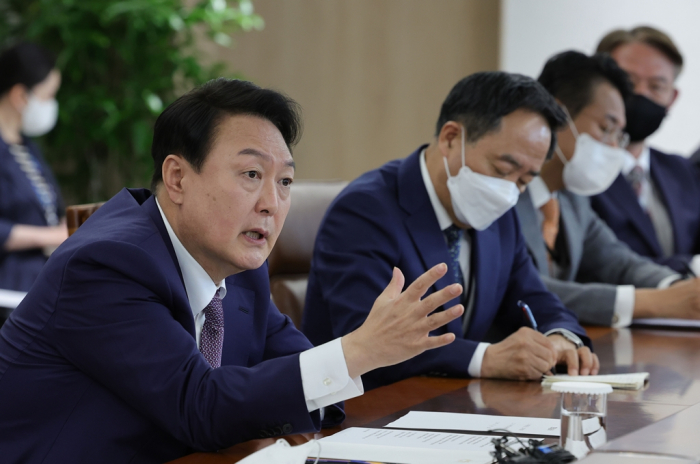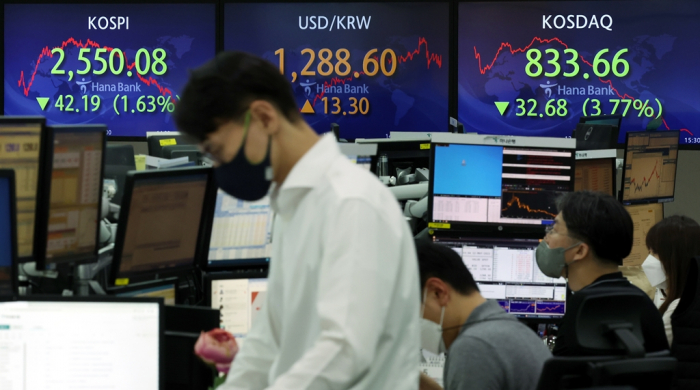Foreign exchange
Korea President Yoon to hold emergency meeting over won
Won hits weakest domestic close in 13 years, boosting concerns over inflation; some urge BOK to raise interest rates
By May 12, 2022 (Gmt+09:00)
2
Min read
Most Read
LG Chem to sell water filter business to Glenwood PE for $692 million


Kyobo Life poised to buy Japan’s SBI Group-owned savings bank


KT&G eyes overseas M&A after rejecting activist fund's offer


StockX in merger talks with Naver’s online reseller Kream


Mirae Asset to be named Korea Post’s core real estate fund operator



South Korea’s new President Yoon Suk-yeol called an emergency meeting as the won currency tumbled to its weakest level since the 2008-09 global financial crisis on Thursday, raising fears over inflation in Asia’s fourth-largest economy.
Yoon plans to hold a meeting with Finance Minister Choo Kyung-ho, Bank of Korea Governor Rhee Chang-yong and other experts on Friday to check recent developments in the financial markets and macroeconomy, according to the presidential office. It was the first time for a central bank chief to attend a meeting chaired by a president since March 2020 when the outbreak of the COVID-19 hit global financial markets.
“The meeting was urgently decided as the foreign exchange and other financial issues turned increasingly volatile,” said an official at the presidential office. “They will discuss not only financial markets but the entire economic situation.”
US INFLATION HITS RISKY ASSETS
The won lost 1% to close the domestic currency market at 1,288.6 against the dollar, the weakest finish since July 14, 2009. The South Korean currency has depreciated 4.1% to the greenback in the last month.
Risky assets also tumbled as headline US consumer prices rose 8.3% for the 12 months to April, slower than the 8.5% pace of a month earlier, but higher than market forecasts for 8.1%. South Korea’s main Kospi dropped 1.63% to end at 2,550.08, the lowest in one and a half years, while the junior Kosdaq tumbled 3.77%.

“The data boosted concerns over inflation (in the US),” said Kim Seung-hyuk, an analyst at NH Futures in Seoul. “That also added to expectations that the Fed is unlikely to slow its policy tightening, hurting the won.”
UNDERPERFORMS OTHER EMERGING CURRENCIES
The won underperformed other emerging currencies as South Korea’s economy heavily relies on China, the world’s second-largest economy, analysts said.
The South Korean unit lost 5% during the period from April 1 to May 10 while other local currencies fell 3.8%, according to the BOK’s data on Thursday.
“Risks from the Chinese economy are mounting as the country locked down major cities such as Shanghai,” said Joo Won, a senior economist at Hyundai Research Institute. “Korea is hit harder than any other country, given its heavy dependence on China.”
The won may weaken past the 1,300 per dollar level in the near term, some analysts predicted. The South Korean unit has been firmer than that level since July 13, 2009.
Such weakness could accelerate inflation further, which already hit a 13-1/2-year peak last month, while the slowing Chinese economy is likely to hurt growth.
The BOK should raise interest rates further as a preemptive move to support the won, some experts warned.
“The won has not weakened further as the BOK has gradually raised policy interest rates since August of last year,” said Shin Se-don, an economics professor at Sookmyung Women’s University.
The central bank last month increased the base interest rate to 1.5% in a surprise move after three hikes since August 2021 as accelerating inflation is feared to bite into economic growth.
Write to Mi-Hyun Jo and Dong-Wook Jwa at mwise@hankyung.com
Jongwoo Cheon edited this article.
More to Read
-
 EconomyKorea April inflation hits 13-1/2-year peak; bond yields up
EconomyKorea April inflation hits 13-1/2-year peak; bond yields upMay 03, 2022 (Gmt+09:00)
2 Min read -
 Central bankBOK unexpectedly hikes interest rate as inflation accelerates
Central bankBOK unexpectedly hikes interest rate as inflation acceleratesApr 14, 2022 (Gmt+09:00)
2 Min read -
 Banking & FinanceBOK restores interest rates to pre-pandemic level
Banking & FinanceBOK restores interest rates to pre-pandemic levelJan 14, 2022 (Gmt+09:00)
3 Min read
Comment 0
LOG IN


